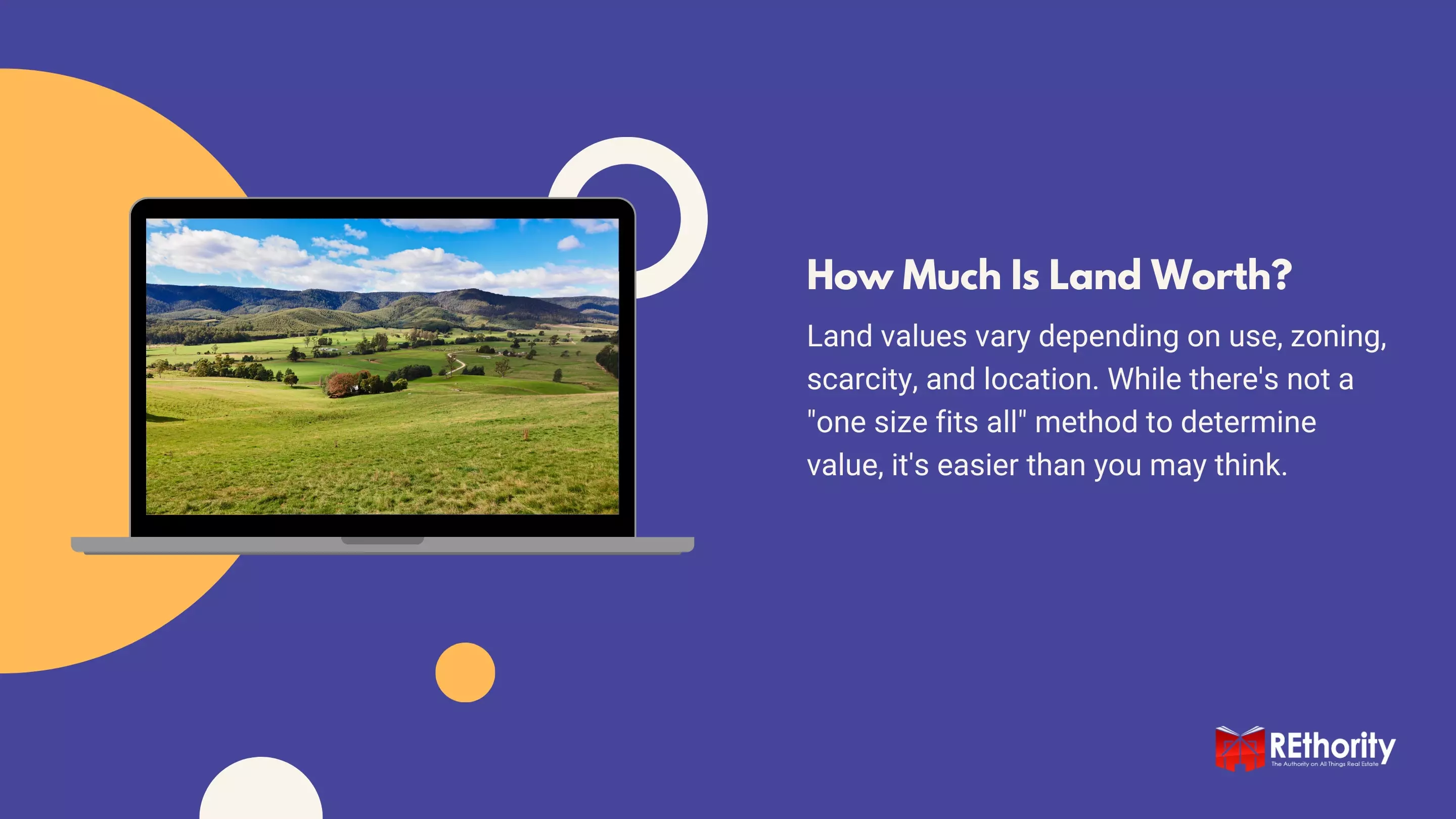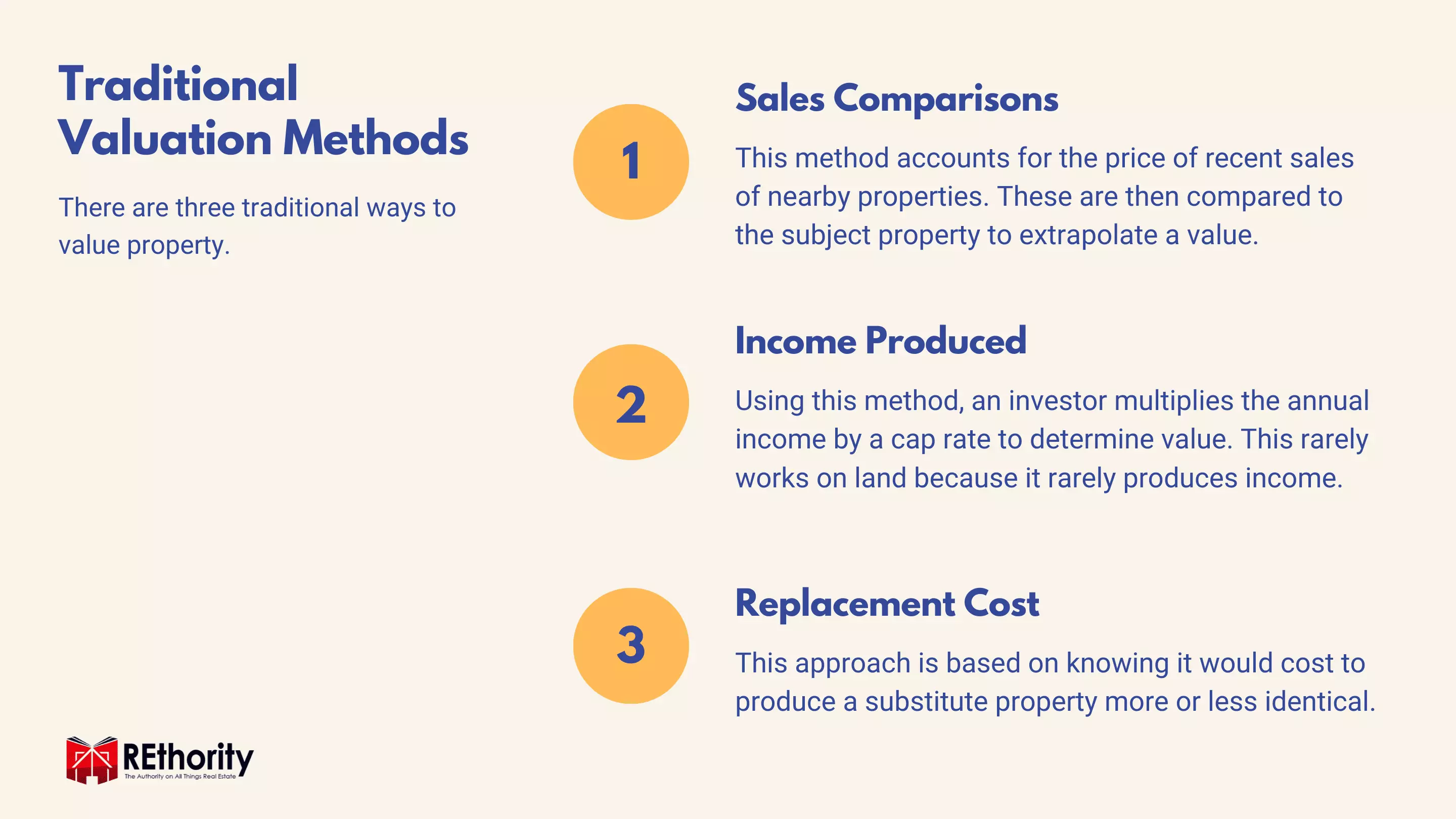If you're a property owner, you've likely wondered, "How much is my land worth?" Understanding the value of your land is crucial whether you plan to sell it or use it as collateral for a loan. We've put together this article to help you find the answers you need.
Traditional Valuation Methods: Are They Enough?
Determining the value of unimproved land is more challenging than valuing properties with buildings. The traditional methods of valuation - sales comparisons, income approach, and cost approach - have limitations when it comes to vacant land. Let's explore why.
1. Sales Comparisons
Sales comparisons involve analyzing recent sales of similar properties in the area. While this method works well for residential or commercial properties, it's less effective for vacant land. Data on land sales is often limited, making it challenging to find truly comparable transactions.
 Traditional property valuation models
Traditional property valuation models
2. Income Approach
The income approach estimates property value based on the income it generates. However, most vacant land doesn't produce income unless it's leased for agricultural or recreational purposes. Therefore, this approach is less applicable for valuing land.
3. Cost Approach
The cost approach determines value based on the cost of reproducing a similar property. Unfortunately, vacant land lacks improvements, making the cost valuation method less useful.
Hiring an Appraiser
If you require a professional valuation, hiring an appraiser is a reliable option. Appraisers use these traditional methods and consider other factors such as community insights and the land's highest and best use. However, keep in mind that appraisers charge fees. It may not be cost-effective unless you have immediate plans for financing or selling the land.
Best Approaches to Valuing Land
While professional appraisers provide the most accurate assessments, you can gain a general understanding of your land's value with some research and analysis. Here are the main factors to consider:
Use
The ultimate worth of land depends on its potential use, influenced by various factors:
- Zoning: Different zoning restrictions significantly impact land value. For example, land zoned for multifamily development is usually more valuable than land restricted to single-family homes.
- Size, shape, and dimensions: Land that isn't suitable for building or has irregular dimensions may have a lower market value.
- Topography: The land's topography can affect its value. For instance, a steep hillside lot may be worth less than a flat and easily accessible one.
- Flood risk: If the land is in a floodplain, building restrictions or additional costs might impact its value.
- Exploitable resources: Land with valuable mineral rights, water rights, timber, or other natural resources may command a higher price.
 What affects land value graphic against blue background with three boxes
What affects land value graphic against blue background with three boxes
Scarcity
The scarcity of land plays a crucial role in its value. If your land is the last available lot in a high-demand market, it's likely to be more valuable. Conversely, if similar properties are abundant, their value is likely to be lower. Research real estate market conditions and consider the uniqueness of your land when assessing its scarcity.
Desirability
Desirability encompasses various factors that are difficult to quantify but significantly influence land value. Consider the following:
- Location: Proximity to employers, schools, and shopping centers impacts desirability.
- Access: Easy access to roadways and transportation facilities adds value to land.
- Utilities: The availability of nearby utilities can increase land value.
- Traffic: Land located on a busy road may be less desirable for residential purposes.
- Neighbors: Surrounding developments or properties influence desirability.
- Aesthetics: Features like views, wooded areas, or existing improvements can enhance land value.
While these factors provide insights into valuing land, it's important to remember that land valuation is not an exact science. Even the most experienced appraisers can't determine the precise sale price without actually selling the land.
Land Valuation Tools
Several tools can assist in estimating the value of your land. Consider using these resources:
Price Boss
Price Boss is a CRM system that gathers land data from sources such as Zillow, Landwatch, and Craigslist. It calculates the price per acre and provides offer suggestions. Price Boss offers two pricing levels: Lite (25 comps per analysis) and Pro (500 comps per analysis). While primarily aimed at investors, it can be beneficial for landowners as well. Price Boss offers a free trial of its Pro version.
Landwatch
Landwatch is an online listing site that connects users with land listing companies. It offers a wide range of properties, including residential, commercial, vacation, recreational, farming, ranches, timber, and hunting land. Users can search for properties based on location, type, price, and more.
Conclusion: Estimating Your Land's Value
While a professional appraiser can provide the most accurate valuation, you can gain a solid understanding of your land's worth by considering its unique characteristics and comparing it to similar parcels. Keep in mind that estimating land value is a complex process, and the final sale price can only be determined through an actual transaction.
Do you have any other tips for valuing land? We would love to hear from you! Contact us via email through our "contact us" page.

















